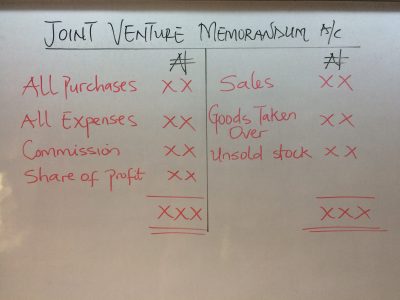Joint Venture Accounting AOC
This summary gives a clear definition and meaning to Joint Ventures Accounting, differentiating between Joint Ventures and a Partnership Businesses, and how to record or post transactions of a Joint Venture.
Summary of a Joint Venture
A Joint venture is a business similar to a partnership, this is, a relationship between two or more people engaged in profit-making business for a defined period of time or with specific limited objectives.
Subscribe to our YouTube channel so as not to miss a tutorial video.
Each of the parties contributes specialist resources to the business, one party may provide the facilities for production while others may provide the finance, technical expertise, business contacts marketing skills etc…
This venture can be found in many businesses like manufacturing, agriculture, exploration, etc. In oil exploration, for example, one party may provide the machines or equipment, and technical skills and another may market the products while the third party may finance the whole operation.
Differences Between a Joint Venture and a Partnership Business
This venture is quite different from a partnership business in the following ways;
- There must exist a defined period when a business relationship must cease, unlike partnership which is usually conducted on a going concern basis.
- The accounting records in a Joint Venture business is decentralized while that of a partnership is centralized.
- It is set up for specific limited objectives while partnership exists for a long-term objective.
- The business is discontinued at the end of the venture, while that of partnership continue in perpetuity.
However, the main objective is to ensure that the business makes a profit which is to be shared in an agreed ratio by the venturers after laying down necessary rules and regulations to guide the venture.
Accounting Records of a Joint Venture
Since the accounting records are kept in a decentralized form, each party records in his own ledger the transactions undertaken by him on behalf of the venture. This is effected by each party opening an account in the name of the other party.
Debited to the Joint Venture Account would be the value of resources acquired for or appropriated to the venture, such as purchases, transfer out of cash, and cost of facilities used, while credit to the Joint Venture account would include sales and transfer in of cash.
At the end of the venture, an overall or total picture of the venture is needed. The method employed is for each party to send to the other party a summarized statement of all the transactions passed through in his account including a valuation of any stock held as of that date. This will enable each party to prepare a composite venture account.
Joint Venture System of Accounting
This account does not follow the principle of double-entry in its preparation, but only shows the total position of the venture from which the total profit or loss can be calculated and its division between respective parties. Each venturer then debits his share of the profit (or credit his share of loss) to the account in his ledger, while corresponding entry will appear in profit and loss account.
The Joint Venture accounts for each venture are then balanced and the final balances should in total be equal. The balance on each Joint Venture accounts is then carried down to the next accounting period or settled by the transfer of cash or other assets as agreed by the ventures.
Format for Preparation of Joint Venture Account
Video Summary/Solution on Joint Venture Account
[wonderplugin_video iframe=”https://youtu.be/1toBIShau1M” lightbox=0 lightboxsize=1 lightboxwidth=960 lightboxheight=540 autoopen=0 autoopendelay=0 autoclose=0 lightboxtitle=”” lightboxgroup=”” lightboxshownavigation=0 showimage=”” lightboxoptions=”” videowidth=600 videoheight=400 keepaspectratio=1 autoplay=0 loop=0 videocss=”position:relative;display:block;background-color:#000;overflow:hidden;max-width:100%;margin:0 auto;” playbutton=”https://hstutorial.com/wp-content/plugins/wonderplugin-video-embed/engine/playvideo-64-64-0.png”]
Got questions? Leave them in the comment section below, we will attend to them.
You can also click here to watch this video summary on Joint Venture and Memorandum Account YouTube.
